|
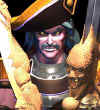
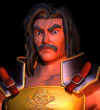



Cervantes
de Leon came from a sea-faring family. His father Phillip Leon was a privateer
employed by the Spanish government. He and others like him did the jobs
the mighty Spanish Armada could not. Phillip commanded a proud ship, and
had been given a special commission by the king to loot in the name of
Spain. Young Cervantes was proud of his father. Phillip had told his son
that a good sailor was always strong and gentle. The life of a privateer
was a dangerous one, though. On one voyage, Phillip's ship moved alongside
an English ship in order to plunder it. Little did Phillip know that he
was stumbling into a trap. The vessel was actually an English warship in
disguise, and it's cannons blasted the Spanish galleon to pieces. Cervantes
was devastated by his father's death. He received his father's hat, Phillip's
only remains. Cervantes became bitter, and came to believe that his father's
allegiance to the crown had gotten him killed. He swore that he would hold
no allegiance to any country, and instead become a pirate loyal to no one.
With his ship, the Adrian, he started a reign of terror across the Atlantic.
No one was safe, not even the invincible armada. Years passed, and Cervantes'
reputation grew.
One
day, Cervantes was visited at his haunt, the Black Tail Inn, by a messenger
from Vercci, the "Merchant of Death." The messenger, named Voldo,
requested Cervantes' help in finding the legendary sword Soul Edge for Vercci. Voldo promised an exceptional reward for the recovery of the sword,
and although Cervantes detested the thought of working for anyone, he accepted
the commission on a lark. Cervantes searched for a year for the sword before
finally finding a clue as to it's whereabouts. At a secret auction, an
English antique dealer had made a successful bid on a strange article.
The man, a Mr. Adams, took the item aboard his ship and left port. Even
though there was no conclusive evidence that this was Soul
Edge, Cervantes
had grown weary of the search and could not give up such an opportunity.
The
Adrian intercepted the ship, and Cervantes found the mysterious item on
board. To his surprise, it was indeed the legendary sword. He took it and
left the crew of the English ship to die. Cervantes decided not to take
the sword to Vercci, and instead use it for his own purposes. Little did
he know that the sword would ultimately possess him. Once he was totally
under Soul Edge's control, he slaughtered his entire crew and the population
of his port base in Spain. After the evil deeds, Cervantes rested in the
Black Tail Inn once more. Temporarily satisfied with it's twisted desire
to consume souls, the Soul Edge rested and prepared to create the "Child
of the Evil Swords." Twenty years passed, and Cervantes was not heard from.
No one ventured to the port, and Cervantes never left. However, the rumors
of the evil swords spread throughout the world. Some believed it was the
sword of salvation, while others believed it was the ultimate weapon. Many
came in search of the Soul Edge, and eventually came upon the port town
and Cervantes. One by one, he defeated those who challenged him and Soul
Edge devoured their souls. There was one though that fought the cursed
fate.
The
Greek warrior
Sophitia, who
had been blessed by the gods, resisted Cervantes' attacks. During the grueling
battle, she actually succeeded in destroying one of the twin swords. The
sword shattered into pieces, and Sophitia was wounded by some of the fragments.
Consumed by rage, Cervantes was about to end her life when Taki challenged
him. Because one of the swords had been destroyed, Cervantes had lost his
control and was thus easily killed by Taki.
The two warriors left Cervantes' body and the remaining sword. Another
warrior,
Siegfried came to
the port town and stumbled upon Cervantes' body. It was at this point that
the essence of Soul Edge completely took control Cervantes' lifeless body.
The demonic creature was nonetheless defeated and Cervantes was finally
and truly dead. Or was he?
Years
later, Siegfried (now known as Nightmare)
brought Cervantes back from the dead for unknown reasons. Freed from Soul
Edge's control for the first time in years, Cervantes began his pirating
career anew. His ship, the Adrian, became a ghost ship and was surrounded
by an otherworldly glow. The eerie sight could be seen at dark when Cervantes
prowled the high seas for his next victim. Due to the spread of the fire,
his victims believed that they were surrounded by a large pirate fleet,
and either abandoned ship or fell into a state of sheer madness. Cervantes
plundered treasure ships from the Americas as well as the Far East, and
even Spanish ships were not spared. Cervantes once again became the terror
of the high seas.
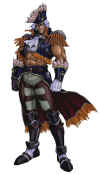
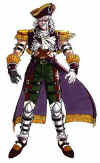
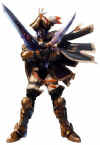
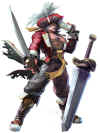
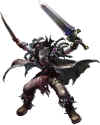
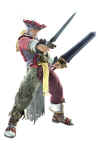
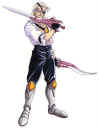
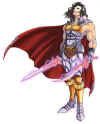
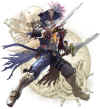
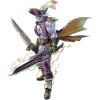
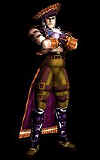
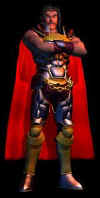
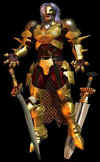
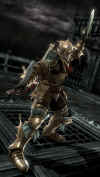
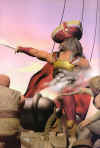
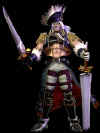
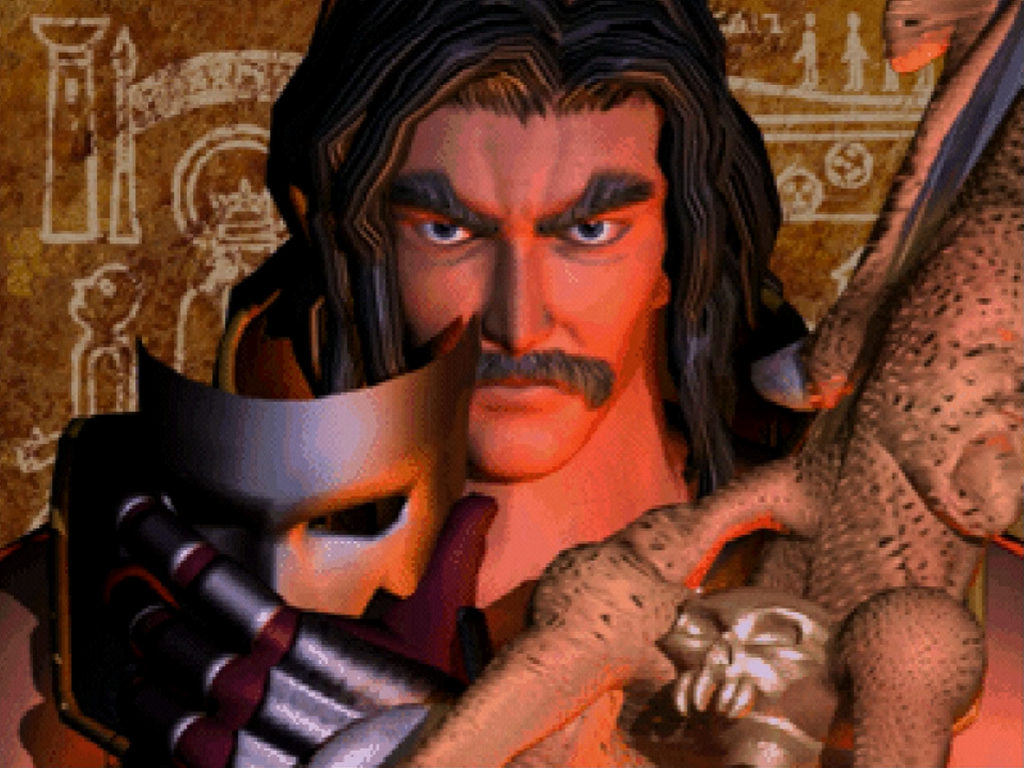
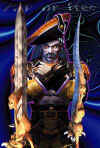
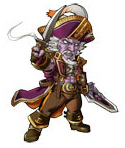
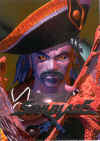
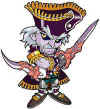
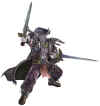





|

|
Page
Updated: May 13th, 2025
|
|
|
Cervantes became an
instant classic when he debuted in Soul Edge. The fighting genre hadn't
seen many "pirates" at the time of his arrival, and he was
definitely cooler than Captain Kidd
from World
Heroes. There weren't many "dual sword users" around in fighting games either, another
element that made Cervantes a compelling character.
He's had a variety of different looks and designs over the years, all of which
are pretty great for their own reasons.
Thanks to some of his crazy special moves (such as his M.Bison-esk
Psycho Crusher), Cervantes's fighting style is far more "fantasy-like" when compared
to others from SoulCalibur. As the sub boss of Soul Edge, some of his
"boss-like" moves were kind of expected... and became a trademark
of his design in future installments. However, he isn't just some 2D boss with
one trick. Cervantes' moveset is epic, dynamic, and was nicely fleshed out from
sequel to sequel. He acquired some cool martial arts double sword-esk moves in
addition to his trademark "gun sword" tactics. I love how Cervantes says "Not Enough" in SC2 (English
version)... it's like he burps it out... and it never fails to make me chuckle. Seriously,
his voice and phrases alone are worth a few points.
|

|
| Fighting
Style / Moveset |

|
| Personality
/ Charisma |

|
| Outfit(s)
/ Appearance |

|
| Effectiveness
in series |

|
| Overall
Score |

|
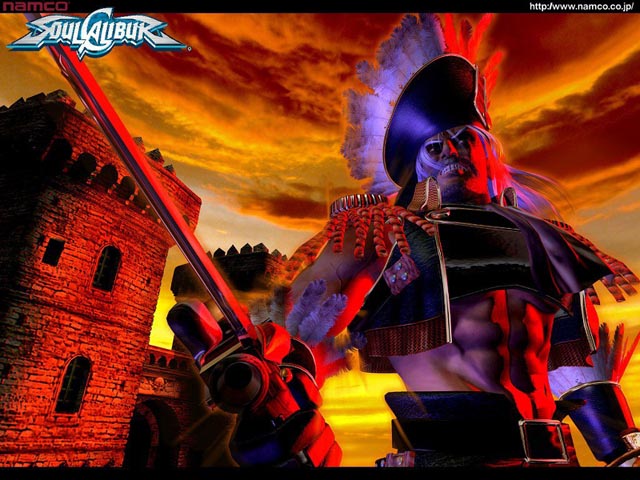
|